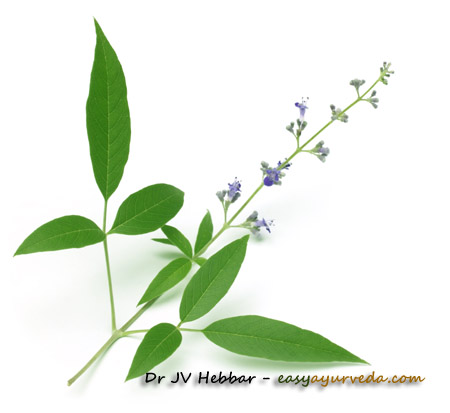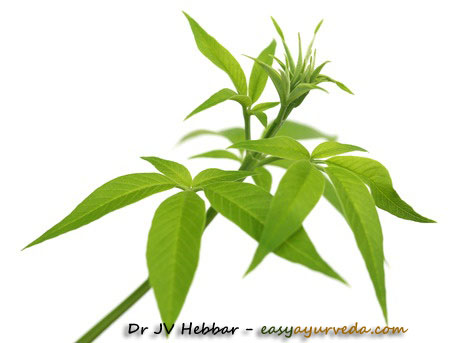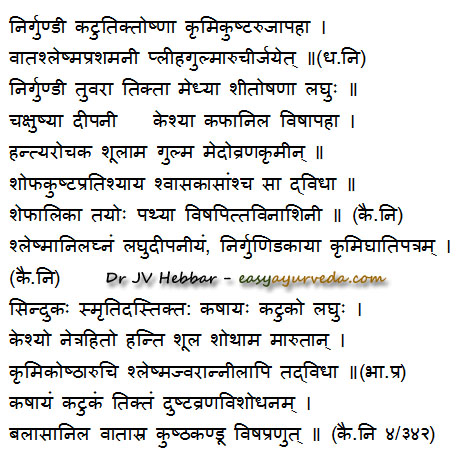Nirgundi – Vitex negundo Uses, Dose, Side Effects, Research
Nirgundi – Vitex negundo is a very good muscle relaxant, pain relieving, anti mosquito, anti anxiety, anti asthma and so on, herb of Ayurveda. There are very few herbs as multi-talented and as versatile as Nirgundi is. Used both for external application in the form of paste / oil, and also for oral administration in the form of powder, leaf juice extract or water decoction.
Botanical Name- Vitex Negundo Linn.
Family- VERBENACEAE (Nirgundi Kula)
Table of Contents
Introduction
Among the oils used to treat arthritis Nirgundi is a common ingredient in most of the preparations. The plant is available in plenty and it is cheaper and more over, a confident herb to reduce the pain and swelling.
The plant Nirgundi is known as Five leaf chaste in English and Sambhalu in Hindi.
Its botanical name is Vitex negundo Linn and it belongs to the verbenaceae family.
The scientists have evaluated its potent analgesic, anti-inflammatory, anti-convulsant, antioxidant, broncho-dilating and hepato-protective activities.
The leaves are the main usable parts. The stem as well as seeds are also in few unique preparations and conditions.
The plant is bitter mixed astringent in taste and it undergoes Pungent kind of bio transformation (Vipaka). The plant is known as hot in potency and hence it is useful in Vata-kaphaja disorders.
Read related: Nirgundi – Vitex negundo Uses, Dose, Side Effects, Research
Important formulations are Nirgundi kashaya, Balanirgundyadi kwatha, Nirgundi kashaya etc.
Home remedies
Few important simple remedies of Nirgundi are as follows-
Joint pain, swelling
1. Fine paste of Nirgundi leaves in swelling and joint pains:
Matured leaves are collected and fine paste is made. This is warmed a little and applied over the joints or the area of swelling. This kind of poutlies are helpful to relieve the pain and swelling significantly.
Asthma, cough
2. Leaf decoction in Asthma and cough:
The leaf decoction (preferably from dry leaves) is administered in the dose of 20-30 m l twice or thrice daily. This pacifies cough, throat irritation, fever, URTI etc. To prepare decoction – 1 tablespoon of leaf powder is added with 2 cups of water, boiled and reduced to half a cup, filtered.
Wounds, ulcers
3. Leaf decoction to wash the wounds and ulcers:
The freshly prepared leaf decoction is used to wash the wounds. It helps in purification and easy and early healing of the wounds.
Nasal discharge, polyps
4. Seed/fruit powder for nasal discharge and nasal polyps:
2-4 grams of powder of its fruits is administered 2-3 times a day. Or else this can be made into hot infusion and administered. It cures disorders of nasal passages, especially rhinitis and nasal polyps.
Body ache, joint pain
5. Nirgundi leaf oil in body ache, joint pain etc:
50 grams of Nirgundi leaves , 200 ml of sesame oil and 800 ml of water or leaf decoction/fresh juice are taken together and oil is cooked. This oil is used to apply over the joints and painful areas. This is a very good analgesic and anti-inflammatory oil.
Click to consult Dr MS Krishnamurthy MD (Ayu), PhD
Nirgundi Vati
Nirgundi vati is the tablet form of Nirgundi; it contains 250-400 mg of Nirgundi water extract in it. It contains most of the properties of the herb.
It is mainly used for the treatment of
abscess, non healing wounds, muscle aches, stiffness, pain, arthritis, anal fistula and anal fissure.
Vernacular names
Hindi Name- Sambhalu, mewri, Nisinda, Sawbhalu
Telugu Name- indhuvara; Vavili; Nalla-vavili; Tella-vavili, Lekkali
Tamil Name-Chinduvaram; Nirnochchi; Nochchi; Notchi; Vellai-nochchi
Bengali Name- Nirgundi; Nishinda; Samalu
English – Five Leaved Chaste
Filipino – Lagundi
Assamese – Pochotia
Chinese name – Huang jing
Kannada name – Bile-nekki, Lakki soppu, Lakki gida, Lekki gida
Punjabi name – Banna; Marwan; Maura; Mawa; Swanjan Torbanna

Sanskrit Synonyms
Nirgundi – Nirgudati Shareeram rakshati rogebhyaha – which protects body from diseases
Sindhuvara – Sindu shotham vaarayati it sinduvaraha – which helps to relieve inflammation
Bhutakesi – Nirgundi alleviate evil spirit
Sitasaha – Plant is having ushna virya, hence it can alleviates sitatva
Indrasurasa – Leaf juice is an efficacious medicine
Shephalika, Suvaha, Sinduka, Sinduvara, Surasa, Shvetapushpa (white coloured flower), Nilamanjari, Vanaja, Hutakeshi

Classical categorization
Charaka –
Vishaghna – anti poisonous group of herbs
Krimighna – anti worm group of herbs
Susruta and Vagbhata – Surasadi
Varieties
Different Varieties of Nirgundi (Sambhalu) –
About six species of Vitex genus were studied for phytochemical profile. Nearly the same constituents were present in all species. (Krishna Rao & Jean, 1996)
Bh. Pr. Ni, Pr. Ni, Dh. Ni – Swetapushpa Nirgundi, Nila pushpa Nirgundi
Ra. Ni – 3 types – Sinduvara, Nila Nirgundi, Sephali
Chemical constituents
Vitex Negundo chemical Constituents
Phenol, Dulcitol, Alkaloid-Vitricine, B-sitosterol, Camphene, a- And B- Pinenes, Angoside, Acunbin, Casticin, Artemetin, Orientin etc.
(Reference: Illustrated Dravyaguna Vijnana, Vol. II, by Dr JLN Shastry)
Medicinal qualities
Nirgundi – Vitex negundo – medicinal qualities:
Rasa (taste) – Katu (pungent), Tikta (bitter)
Guna (qualities) – Laghu (lightness), Rooksha (dryness)
Vipaka – Katu – undergoes pungent taste conversion after digestion
Veerya -Ushna – hot potency
Effect on Tridosha – Balances Vata and Kapha.
Part used, dose
Nirgundi – Part used- Leaf, root, seeds
Five leaved chaste Dose
Leaf juice 10-20 ml,
Root bark powder 3-6 g,
Seed powder 3-6 g, in divided doses per day, is the adult dose.
Utpatti sthana
It is found in almost all regions of India especially in hot weather areas.
Morphology
Root- Branched, cylindrical
Stem- Pinnately compound, digitately 3 to 5 foliate, leaflets are oblanceolate, grey-pubescent below.
Inflorescence- Dichasial cyme
Flower- Bracteate, pentamerous, bisexual, zygomorphic and complete, sepals are 5, shortly 5-toothed, petals are not 5, upper lip two to bed, much shorter than the lower, purple to violet in colour stamens are 5 in number.
Fruit- Small, globose, drupe, seeds are ovate oblong shaped with a straight embryo.
Parts used-
(Root), Patra (Leaf).
Roots are stout cylindrical 2 to 7 cm in diameter. External surface is greyish brown colour, longitudinally wrinkled with occasional warty protuberances and circular root scars. It has a slight aromatic odor and bitter taste.
Sanskrit verse

Uses
Vitex negundo uses:
Krumi – useful in intestinal worm infestation
Kushta – useful in skin diseases, eczema, ringworm
Rujapaha – relieves muscle and arthritis related pain
Pleeha – useful in spleen disorder
Gulma – useful in abdominal tumor
Aruchi – useful in anorexia
Medhya – improves intelligence, relieves anxiety
Netrahita, Chakshushya – good for eyes,
Deepani – carminative
Keshya – improves hair quality
Vishapaha — anti toxic, anti poisonous
Shulahara – useful in abdominal colic, antispasmodic
Amahara – useful in Ama (a product of altered digestion and metabolism)
Medohara – useful against cholesterol
Vranahara – heals wounds faster
Vranakurmi here – cleanses wounds
Pratishyaya – useful in running nose
Shwasahara – useful in asthma, bronchitis
Kasahara – useful in cold, cough
Smrutida – improves memory
Its fumes are useful in getting rid of mosquitoes.
Properties of nirgundi flower
According to Bhojana Kutuhalam in the context of flowers, The flower of nirgundi is said to have bitter taste, cold potency, helps to treat vata and kapha related disorders, gulma, splenic disorders, tastelessness, various skin conditions, itching and edema.
External application
The leaves are made into paste, heated a little and applied externally to relieve headache, orchitis (swelling in testicles), rheumatoid and osteoarthritis.
Water decoction of Nirgundi is used for vaginal douche to relieve local inflammation
Water decoction is used for mouth gargling to relieve throat pain and oral ulcers.
The dry leaves are burnt and fumes are inhaled to relieve headache and running nose.
Its oil is prepared with sesame oil and used in wound healing and gray hairs.
Interaction with medicines, supplements
Can this be used while taking Homeopathic medicine?
Yes. This product does not react with homeopathic medicine.
Can this medicine be continued while taking supplements like multivitamin tablets, Omega 3 fatty acids etc?
Yes. Generally, this product goes well with most dietary supplements. However, if you are taking more than one product per day, please consult your doctor for an opinion.
With western
medicines
Seek your
doctor’s advice if you are taking this product along with other western
(allopathic / modern) medicines. Some Ayurvedic herbs can interact with modern
medicine.
If both Ayurvedic and allopathic medicines are advised together, then it is
best to take Allopathic medicine first, wait for 30 minutes and then take the
Ayurvedic medicine.
Research
Vitex negundo – research:
Larvicidal activity against mosquito larvae
Hepato-protective activity of ethanolic activity
Anitpyretic activity of alcoholic extract
Anti fungal activity
Ayurvedic medicines
Ayurvedic medicines with Vitex negundo –
Saraswatarishta, Manasamitra vatakam – Nirgundi being anxiolytic and medhya (improving intelligence), helps these medicines to fight anxiety and depression. Also, it also relieves pain. Hence, useful in fibro-myalgia, associated with depression.
Dashamool Taila – useful in vascular headache, migraine
Mahavat Vidhwans Ras – useful in neuralgia, aches and pains
Anthrakutaram gulika – useful in abdominal colic, constipation, bloating
In Vata Gajankush ras, an Ayurvedic medicine, the leaf juice extract of Vitex negundo is used for trituration (Bhavana) or grinding of the powders of medicine. It acts as a binding agent and also imparts medicinal qualities to this product.
Sthanika Karma (Systemic Action)

External – Relieve pain and edema, promote hair growth, cleanses wound and promote healingHot fomentation with its leaf is indicated in Headache, Arthritic pain, joint inflammation etc. Pouring of the decoction in Lower abdominal area is indicated in inflammatory conditions of Anal region, gynecological disorders, lower abdominal pain, inflammation in scrotum etc. Gargling with its decoction is beneficial in mouth ulcer, throat pain. Fumigation with dry leaves indicated headache and running nose. Oil can be applied in wounds, graying of hairs.
Nervous System – vatahara(Pacify vatadosha), improve intellect and brain function. indicated in painful inflammatory conditions, Amavata, Sciatica, headache.
Digestive System – stimulates the liver. It has carminative property. Ama pachana, Anti helminthic. indicated in anorexia, Helminthiasis. Its leaf juice along with cow urine is beneficial in splenic disorders.
Circulatory System – Helps to reduce edema.
Respiratory System – Alleviate kapha dosha, Indicated in Cough, Pleurisy, lung inflammation
Satmikarana – rejuvenative, Promote body strength
Excretory system – Increase urine production.
Reproductive System – Indicated in gynecological disorders like dysmenorrhea, and postpartum diseases
Skin – Indicated in various skin disorders, itching, boils etc.
Tapakrama – Indicated in Fever (Vishamajvara / intermittent fever) Its leaf juice can be administered as an adjuvant in fever along with other medicines.
Eye – Good for eyes (Chakshushya), improve eyesight
Ear – Indicated in ear infection (Karna srava)











44 comments
Dr. Veena
Great information.
Thank you Sir
Dr J V Hebbar MD(Ayu)Author
Thanks
Dr J V Hebbar MD(Ayu)Author
Thank you very much.
Nahid
Hello, when you talk about the rasa, guna and vipaka – are you referring to the berry? leaves? or the root? And for the uses – which part of the plant has these healing qualities. In the West vitex berry tinctures are very popular for women’s heath – specially for menstrual disorders. We use vitex berry tincture or capsule the most. – thank you.
Dr J V Hebbar MD(Ayu)Author
Hi, the properties explained are for Leaf, root and seeds.
Thanks for value addition.
Best regards
Dr.A.Murugan
Excellent article. Is it useful for animal diseases
pankaj
hello a
pi
lease give information about the variety of nirgundi from which oil is to prepare use in liniment
Dr J V Hebbar MD(Ayu)Author
Vitex negundo is the one.
arun
Sir whn i use fr phimosis any side effect?????
Dr Malini Bhat
Sir, No side effects.
Apply Nirgundi tailam — it can be used in phimosis to loosen the foreskin. Daily morning, 10 minutes before bath, apply this and try to stretch foreskin.
dr.anjali
thanks sir its really work…..i m pg student in u.p….i want more detail in vitex negundo linn. about how its work 0n pesticides
Bhuvan Chaturvedi
Can nirgundi oil be used for anal fissure?
sasikala
In the web page, i can see two different types of Nirgundi plants, 1. with five leaf 2. with three leaf with purple colour flowers. which is the correct nirgundi.
do both has the same medicinal uses.
Sasikala
Dr J V Hebbar MD(Ayu)Author
One with five leaves.
jaime beth
can vitex negundo and vites agnus be used interchangably or do they each have different indications? thank you
Dr J V Hebbar MD(Ayu)Author
They are different. Vitex agnus castus is commonly used in treating pre-menstrual syndrome, female infertility, menopausal symptoms etc.
Vijay
Sir, What Vitex agnus castus called in hindi?? Do you know any online website to purchase the same??
Sanjay Kumar
मेरा युरिक एसिड 6.5 निकला है. मैं सिनदुआर(निरगुनडी)का काढ़ा पिता हु तब दर्द ठीक हो जाता है. लेकिन फिर हो जाता है. तो फिर किया निरगुडी युरिक एसिड नही घटाता है. सिर्फ गरम होने के कारण दर्द घटता है. कमर दर्द जकडन. एडी मे दर्द. धुटना में दर्द. उपचार बताए
Dr J V Hebbar MD(Ayu)Author
Sirf Sinduvar se shayad uric acid kam nahi ho pata hai.
Krupaya ek Ayurvedic doctor ko direct consult keejiye.
harsha Vardhan
Can nirgundi paste be applied for hair for grey hair
Dr J V Hebbar MD(Ayu)Author
Better to use it for only 2 – 3 months time.
Shweta Jain
My prolactin level is very high it is 57.83..how to take vitex. .to cure it
ashive sajwar
Side effect of nirgundi oil in face.
Dr J V Hebbar MD(Ayu)Author
Usually it is well tolerated without producing any irritation.
Leena
Muze ingrown toenail problem hai….kya main nirgudi pala use kar sakti hu….n kaise
Dr J V Hebbar MD(Ayu)Author
Nirgundi tail locally apply karne se kuch fayda ho sakta hai.
Shy
Will it help in my hormonal pimples problem which happen just before my period starts. I have bought nirgundi kwath and shatavar
Chanchal
HOw can we use Vitex negundo in asthma.
Sweety
Is there any side effects of nirgundi to heart patient?
Dr J V Hebbar MD(Ayu)Author
No.
Dr J V Hebbar MD(Ayu)Author
It is useful. Apply it over both external wound andd anal opening.
Do not mix with any other oil.
Oregano oil can also be used similarly.
Dr J V Hebbar MD(Ayu)Author
It is useful to reduce pain. Its paste made with castor oil is applied locally to reduce pain.
Vd.Santosh Nevpurkar Ph.D.[Ayu]
Nice information and application also
Dr J V Hebbar MD(Ayu)Author
Thank you 🙂
Moni
Hi, will taking this internally help prevent Fístulas? Thank you
O.P.Gulati
Dear Sir,
for treatment of uric acid you can use homeopathic medicine “URTICA URENS Q”. This medicine is very useful. you can take 5-7 drops in luke worm water 3 times a day. please avoid protein rich items, like whole pulses, kabli chana, kidney beans, cheese, peas, peanut. do not use soya refined oil. or soya paneer or soyabeans. have patience it will take time to cure. once you will start taking the same within month you can see some result but you need to take until you get rid of the problem. tested medicine.
Shiju
Hi Doc,
How to use the leaves for arthritis related swelling n pain
Dr J V Hebbar MD(Ayu)Author
Dip the leaves in sesame oil or castor oil. Heat it over a Tava / pan for 2 – 3 minutes. apply the leaves over the painful swollen area – do this 2 – 3 times a day.
Rajendra Patel
Can we chew leaves for better health and improve digestion?
Dr J V Hebbar MD(Ayu)Author
I have not come across such a practice.
Akhtar
Can Nirgundi tablets can be taken along with Kaishore Guggul tablets?
Tamal Dutta
How to extract oil from Nirgundi?
Dr J V Hebbar MD(Ayu)Author
Nirgundi dry powder is added with sesame oil and water and boiled together till water evaporates.
Here is the detailed explanation with Amla as example.
https://www.easyayurveda.com/2012/04/18/how-to-make-hair-oil-at-home-with-amla/